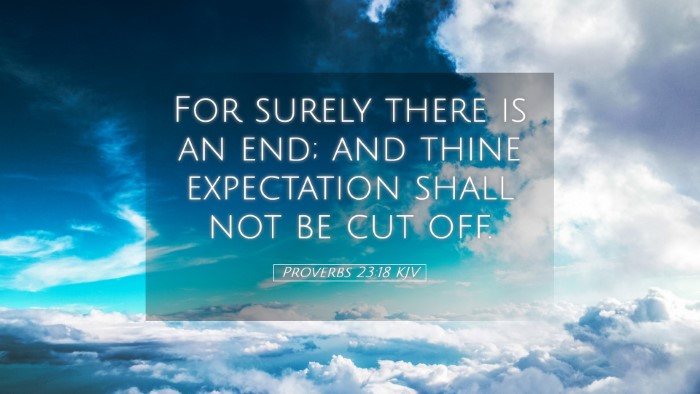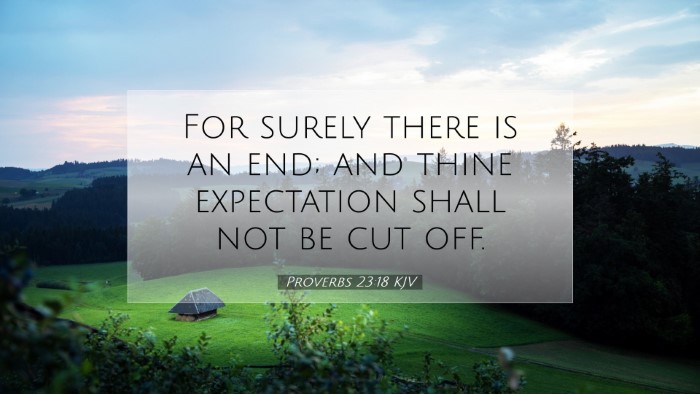Commentary on Proverbs 23:18
Verse: "For surely there is an end; and thine expectation shall not be cut off." (Proverbs 23:18, KJV)
Overview
This verse from Proverbs speaks to the fulfillment of hope and the assurance of a future reward. It is a powerful reminder to believers that their faith and expectations in God will ultimately lead to fruition. The context amplifies this sentiment, encouraging prudence and restraint in all aspects of life, including lifestyle choices and relationships.
Insights from Public Domain Commentaries
Matthew Henry's Commentary
Matthew Henry emphasizes the certainty and prosperity found in true expectations that are rooted in faith. He points out that the passage reassures believers that their anticipation of rewards, both present and expected, will not be in vain. The 'end' refers to the culmination of God’s promises, reinforcing the notion that diligent living produces godly outcomes.
- Hope Anchored in God: Henry notes that the 'expectation' mentioned in the verse is not just a wishful thought but a confident assurance grounded in God’s faithfulness.
- Contrast of Foolishness vs. Wisdom: The surrounding verses urge readers to avoid the temptations of drunkenness and gluttony, suggesting that misaligned pursuits jeopardize the fulfillment of godly expectations.
- Enduring Promise: The certainty of reaching the 'end' speaks to the overarching Biblical theme of redemption and the hope of eternal life, encouraging believers to maintain their integrity in a world that often values immediate gratification.
Albert Barnes' Notes on the Bible
Albert Barnes complements the understanding of this verse by elaborating on the nature of expectations. He states that the 'end' represents a goal that believers can anticipate confidently, especially in their moral and spiritual journeys. Barnes encourages believers to remain steadfast and focused on their aspirations toward spiritual maturity.
- The Assured Future: Barnes articulates that this verse encapsulates a fundamental principle found throughout Scripture: that God brings to completion the good work He begins in us (Philippians 1:6).
- Spiritual Application: Believers should cultivate their expectations according to God's promises, realizing that true satisfaction is a product of living in alignment with His will.
- Warning Against Disappointment: With a warning against foolish choices, Barnes highlights that the wrong paths lead to dashed hopes, while walking in wisdom leads to the fulfillment of one’s life purposes.
Adam Clarke's Commentary
Adam Clarke offers a pastoral approach by discussing the importance of maintaining hope in difficult circumstances. He notes that the proverb encapsulates the timeless truth that God is aware of our expectations and desires to fulfill them in accordance with His divine plan.
- Sustaining Hope: Clarke points out that the believer's hope is linked to the broader understanding of divine providence and timing. Waiting for God's fulfillment, he argues, is part of exercising genuine faith.
- Eternal Perspective: He emphasizes viewing life through the lens of eternity; the assurance that one's spiritual endeavors will yield fruit, either now or in the life to come.
- Divine Encouragement: Clarke ties the verse to broader theological themes of suffering and perseverance, urging believers to remain steadfast as they await God’s ultimate promises.
Theological Implications
The implications of Proverbs 23:18 extend deeply into the theological framework of hope, expectation, and divine providence. Pastors, students, and theologians can derive several key principles from this verse:
- The Nature of Hope: A dynamic concept throughout Scripture, hope is more than optimism; it is a confident assurance in God’s character and His promises.
- Faith and Actions: Our expectations must lead to actions that align with God’s will. This reinforces the relationship between faith and works emphasized in James 2.
- Moral Living: The context of Proverbs 23 illustrates the importance of wise living as a precursor to experiencing God's blessings.
Conclusion
In Proverbs 23:18, we are met with the profound assurance that our expectations, inspired by faith and aligned with God’s purposes, will not lead to disappointment. The insights from ancient commentaries remind us to cultivate our hope, live righteously, and trust in the ultimate goodness of God. This verse calls the faithful to endure, engage in wise living, and anticipate the fulfillment of God’s promises with assurance and joy.


